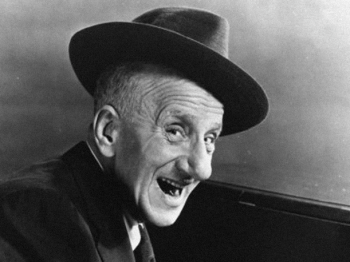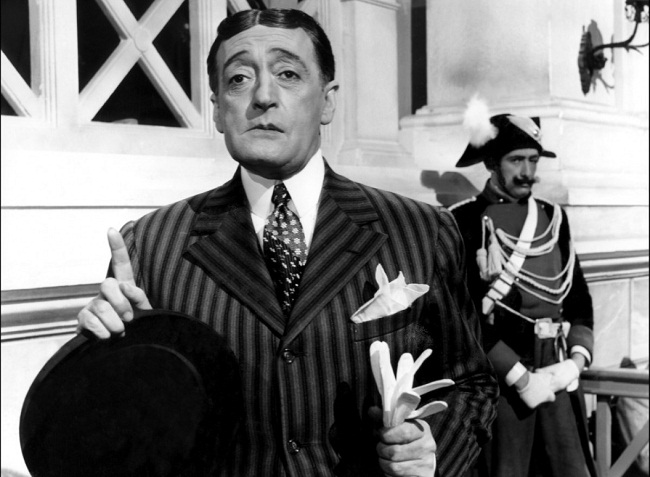Dear Readers,
February is named after Februs, Roman god of purification. February was his sacred month and the Latin Februa means “feast of purification”. February is the shortest month of the year, only 28 days this year, but Febbraio is full of dates with an Italian Connection:
Emilio Gino Segré (born in 1905 in Tivoli) was awarded the Nobel prize in physics in 1959 for the discovery of the anti-proton, together with another physicist at the University of California at Berkeley. Segré also discovered technetium, the first element produced artificially.
Brian Boitano won the U.S.A. men’s singles figure-skating championship, held in Kansas City, MO in 1985.
St. Blaise, bishop and martyr, according to a 320 AD legend, helped save the life of a boy who was choking to death because of a fish bone which had stuck in his throat. Now on Saint Blaise’s Day, many churches have a blessing of throats. The priest crosses two unlit candles and puts them under your chin, says a prayer and asks God to bless you and keep your throat healthy.
Enrico Tonti (1649-1704) made the first descent of the Mississippi with LaSalle. The Italian explorer, in 1692 took formal possession of the Arkansas territory for King Louis XIV. The Indians, respecting him, began calling him Bras de Fer, the iron-handed man, as he had lost a hand in battle.
St. Agatha, virgin and martyr born in Sicily. The feast of St. Agatha is dramatically celebrated in Catania, where the people shout her praises as twenty-foot high wooden bell towers called “cannalore” decorated with flowers, candles, and banners are carried by the bearers with stops at the local churches and Saint Agatha Shrine. Born of noble parents, she was tortured after she resisted the advances of Quintian, a Roman governor, who desired her. She expired while praying in the year 251 AD.
Charles A. Siringo (1855-1928), born February 7, 1855 in Matagorda Peninsula, Texas, to an Italian immigrant father, who died when Charles was only a year old. His Irish mother, Bridget, had to struggle to support Charles and an older sister, age 3. Charles became a famous cowboy and Pinkerton detective and helped capture “Billy the Kid”. A writer of episodes in the west “A Texas Cowboy” sold over a million copies.
St. Jerome Emilani (1481-1537), born in Venice. Jerome served as a soldier in the Venetian army and rose to command the League of Cambrai forces at the mountain fortress of Castelnuovo. Following a military defeat, he was imprisoned, but miraculously escaped to freedom. He resolved to dedicate himself to God and when famine and the plague struck the Venetian Republic, Jerome devoted himself to caring for and educating children orphaned by the disaster.
By 1513, he founded orphanages in Brescia, Bergamo and Como. Jerome was the first individual to teach children religion by using a Catechism. He caught an infectious disease while caring for the sick and died February 8, 1537.
Joe Pesci (born Feb. 9, 1943 in Newark, N.J.). By age ten, he was a regular on a T.V. show called Star Time Kids which also featured Connie Francis. The actor often portrays characters with a tough edge, but off screen he is said to be a big-hearted softie.
 Jimmy Durante
Jimmy Durante
Jimmy Durante
Jimmy Durante was born February 10, 1893 in New York and died in 1980. He was one of the most famous vaudeville, radio and television stars in America.
“The Schnozz” (he insured his nose with Lloyd’s of London for a million dollars against any possible “catastrophe”) was imitated in nightclubs all over the country- a supreme mark of success- but his piano playing, his strutting, his singing, his sight-gag appearance and his warmth were his own personal trademarks. “As long as dere’s night-clubs, and my legs and my verse holds out, I’ll be around in dem laughin’ it up”. Durante, and his renditions of Inka Dinka Doo, Unbriago and The Lost Chord (all of which he wrote himself) incited even the most jaded club customers to spontaneous applause.
Casa Italiana of Los Angeles was founded in 1972, largely through the fund raising talent of Father Luigi Donanzan.
Valentine’s Day, romantic Italian restaurants are filled to capacity and an estimated 800,000 Valentine greeting cards are exchanged.
According to legend during the reign of Emperor Claudius II, the Romans saw many unpopular military campaigns. In an effort to strengthen his military, Claudius outlawed marriage for young men, believing that men with wives and families made poor soldiers.
Saint Valentine, a Roman priest under the rule of Claudius II, defied the emperor’s decree and continued to secretly perform marriages for young lovers. When Valentine’s actions were discovered, he was imprisoned, condemned to death and beheaded on February 14, 270 AD.
During his confinement, Valentine fell in love with the daughter of a jailer, who showed him great kindness.
Before he was taken away, he slipped her a note and signed it, “From your Valentine”, unknowingly establishing a tradition that would become a gold mine for greeting card companies many centuries later.
Totò, stage name of world renown prince of commedia Italiana, was born Antonio Vincenzo Stefano Clemente, in Naples in the Sanità neighborhood, at no. 109 Via Santa Maria Antesaecula, on February 15, 1898. His birth certificate filed at the city hall in Naples says “Clemente Antonio son of Clemente Anna, unwed”. Totò only took his father’s name when he was thirty years of age. His mother Anna Clemente, of a poor family, fell in love with Marquis Giuseppe de Curtis, hard up scion of an ancient family on the skids. After some lovemaking on the sly Anna was made pregnant, while the marquis, terrified over his father’s prohibition, did not assume his paternal responsibilities.
Totò loved the theatre but starting in 1947, he devoted himself to cinema with great success, making 97 films in all.
He always said that he had gone to the cinema because it paid better, and because at a certain age one cannot live far from home and sleep in a new bed every night.
On April 15, 1967, he died after a series of cardiac crisis, in his home in Rome.
Tommaso Crisafi died in February 1696. He was in command at Fort Onondaga in New York. He prevented an invasion by the Iroquois Indians.
Victor Iannidinardo was born in 1912. He established the first chain of co-ed health gyms in 1949, known as Vic Tanny Health Spas.
Eddie Arcaro was one of three jockeys who passed the 4,000 win mark. Arcaro was born in February 1916 in Cincinnati, Ohio, but went to high school in Newport, Kentucky. He was the author of “I Ride to Win”.
Adelina Patti, soprano born February 1843, in Madrid- of Italian parentage, was taken to the U.S. at age seven and semi-retired at age 10 after 300 concerts in order to allow her voice to develop without risk of strain. She died in Wales in 1919.
George Washington (1732-1799) was our first president. February 22 is George’s traditional birthday, but now we celebrate President’s Day on the third Monday in February. Many Italian-Americans fought in the American Revolution War (Mazzei, Bellini, Rossi, etc.).
President’s Day weekend is a good time to remember Thomas Jefferson, our 3rd president (1801-1809) who loved Italian things, his home “Monticello” was modeled after one of Palladio’s Villas. His music teacher, signor Alberti, was an Italian concert artist. And as a widower, he loved Italian born Maria Conway.
Nick La Rocca, leader and cornetist of the original Dixieland Jazz band, died February 22, 1961 at his home in New Orleans. Born in 1889, Nick was the son of Girolamo La Rocca, an immigrant shoemaker and amateur cornet player who did not encourage his son’s interest in music. After his father’s death in 1904, young Nick went to work as an electrician in the Opera house where he heard all the performances by the elite of the opera world.
Amerigo Vespucci (1454-1512) born in Florence, he moved to Spain at age 31. His latinized name Americus, was given to the new continent America. A letter written by him and published circa 1503 titled “Mundus Novus” (New World) established him as a famous explorer.
Arizona became the 48th State of the Union in February 1912. In 1965 the State of Arizona dedicated a statue of Fr. Eusebio Chino in the Hall of Columns in the House of Representatives.
Enrico Caruso was born February 25, 1873 in Naples, Italy. The most famous tenor made his debut in New York in 1903 in “Rigoletto”. He died August 2, 1921 in Naples.
Galileo Galilei was born in February 1554 in Pisa. Among other experiments conducted by the famous scientist, he tried dropping two things of different weights off the top of the “Leaning Tower of Pisa” like a bag of potatoes and a bag of feathers. To everyone’s surprise, both bags dropped at the same speed. Galileo was the first man to construct and use the telescope.
February is the shortest month of the year. Thirty days hath September, April, June and November. All the rest have thirty-one. But February, in 28 days is done…
***





























